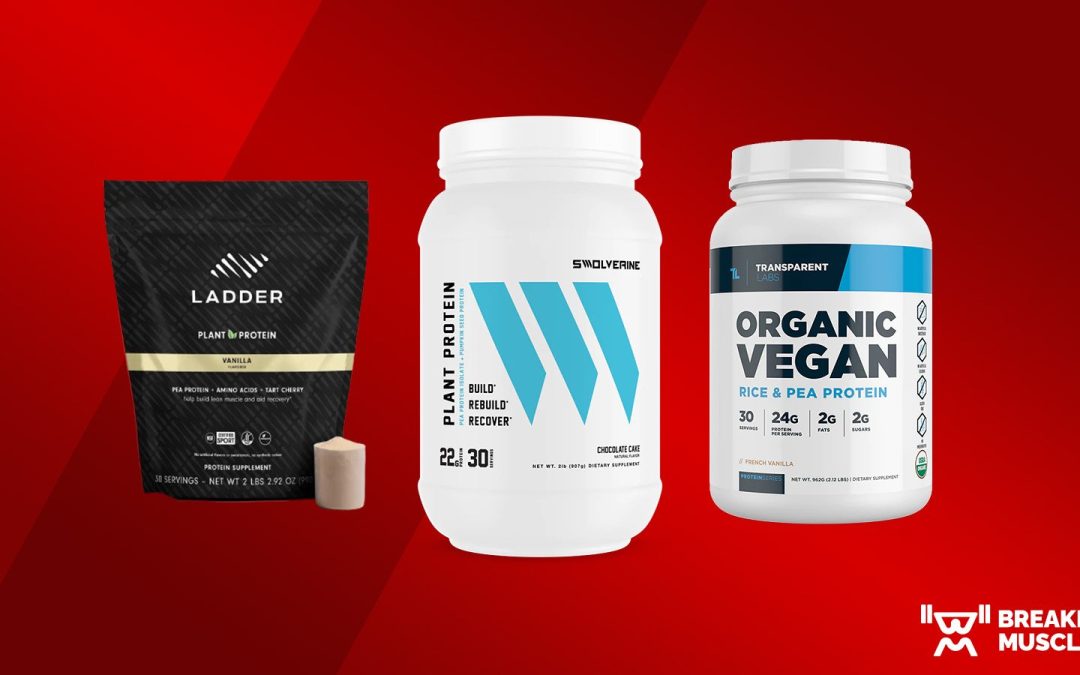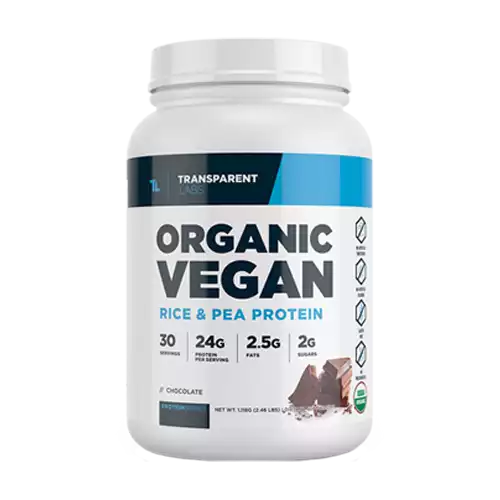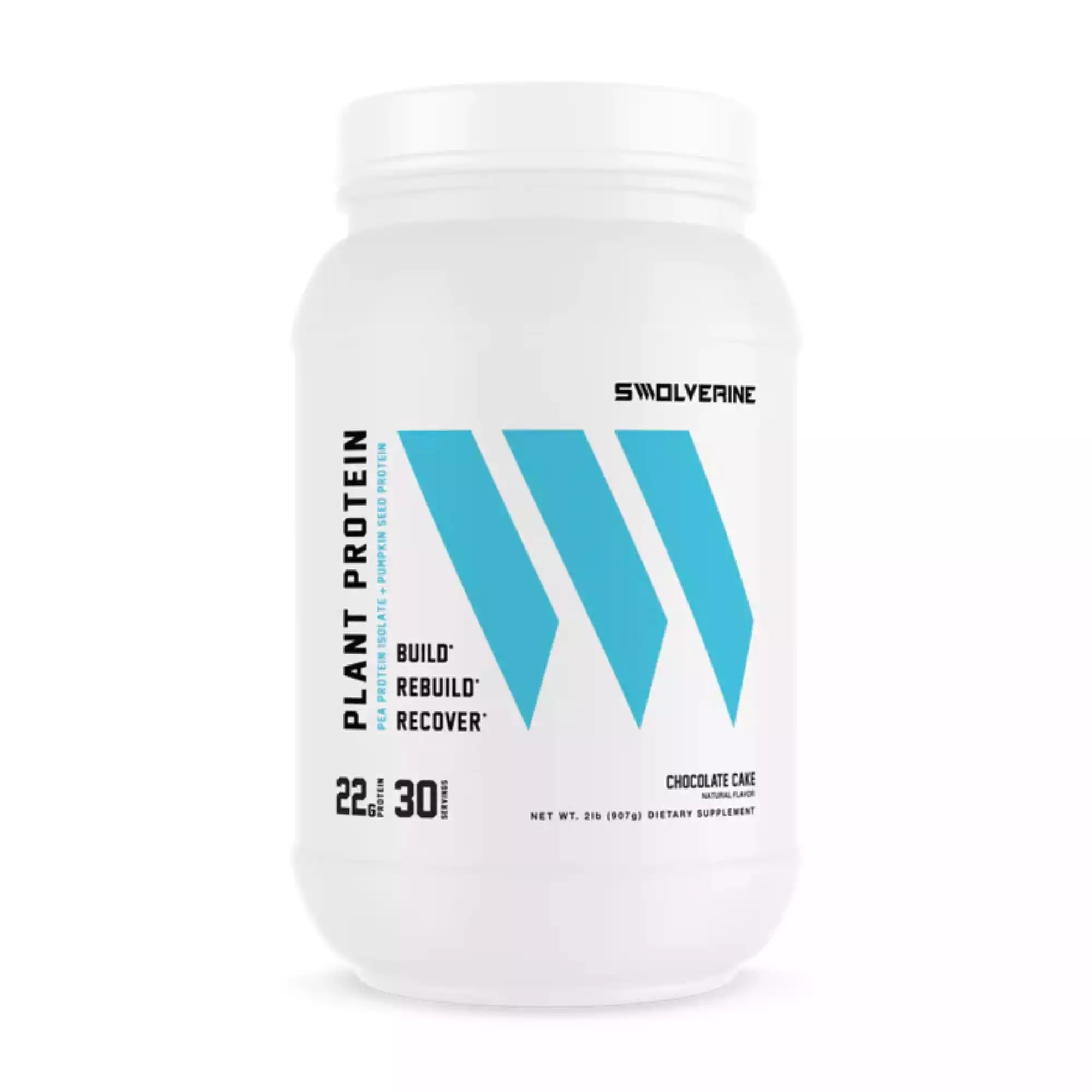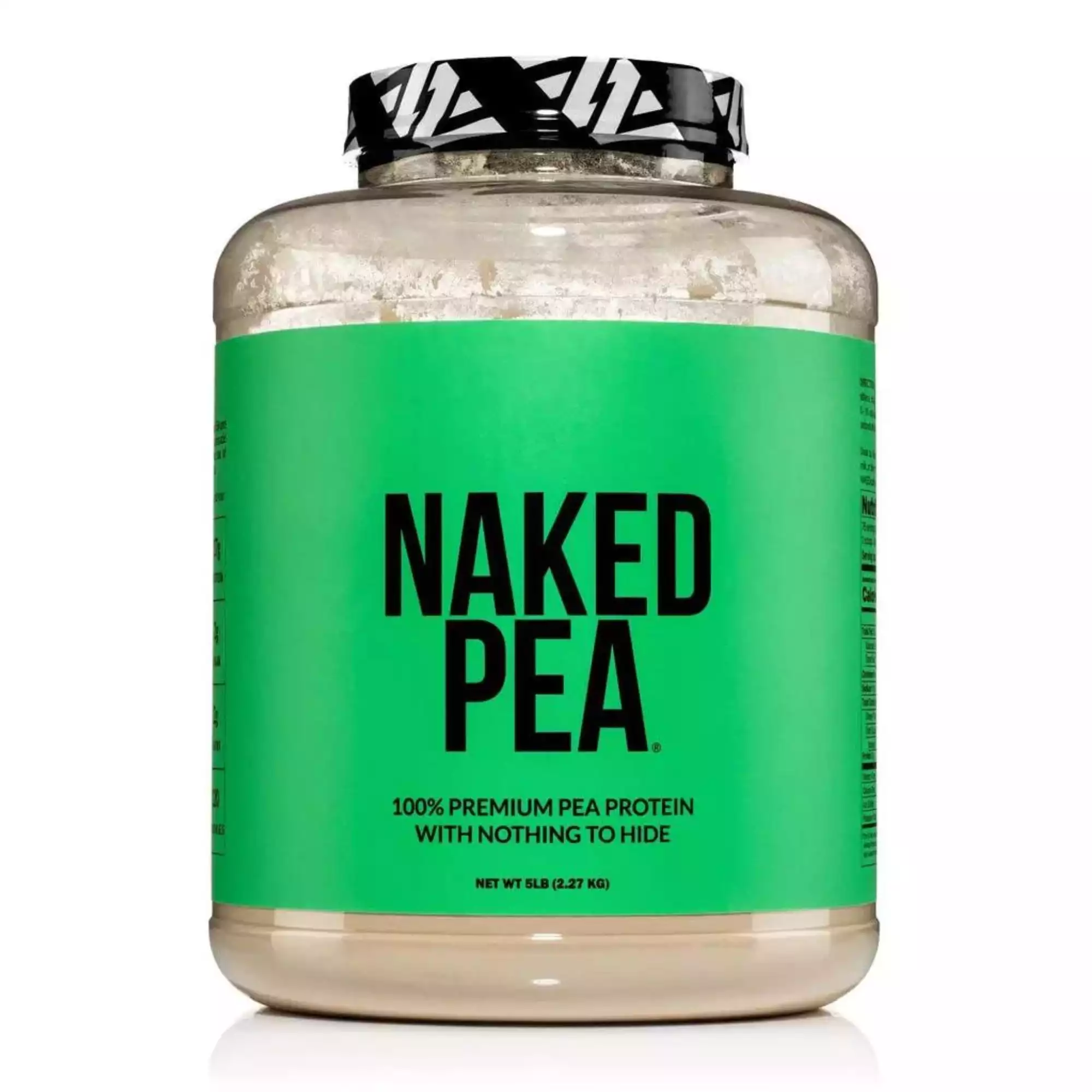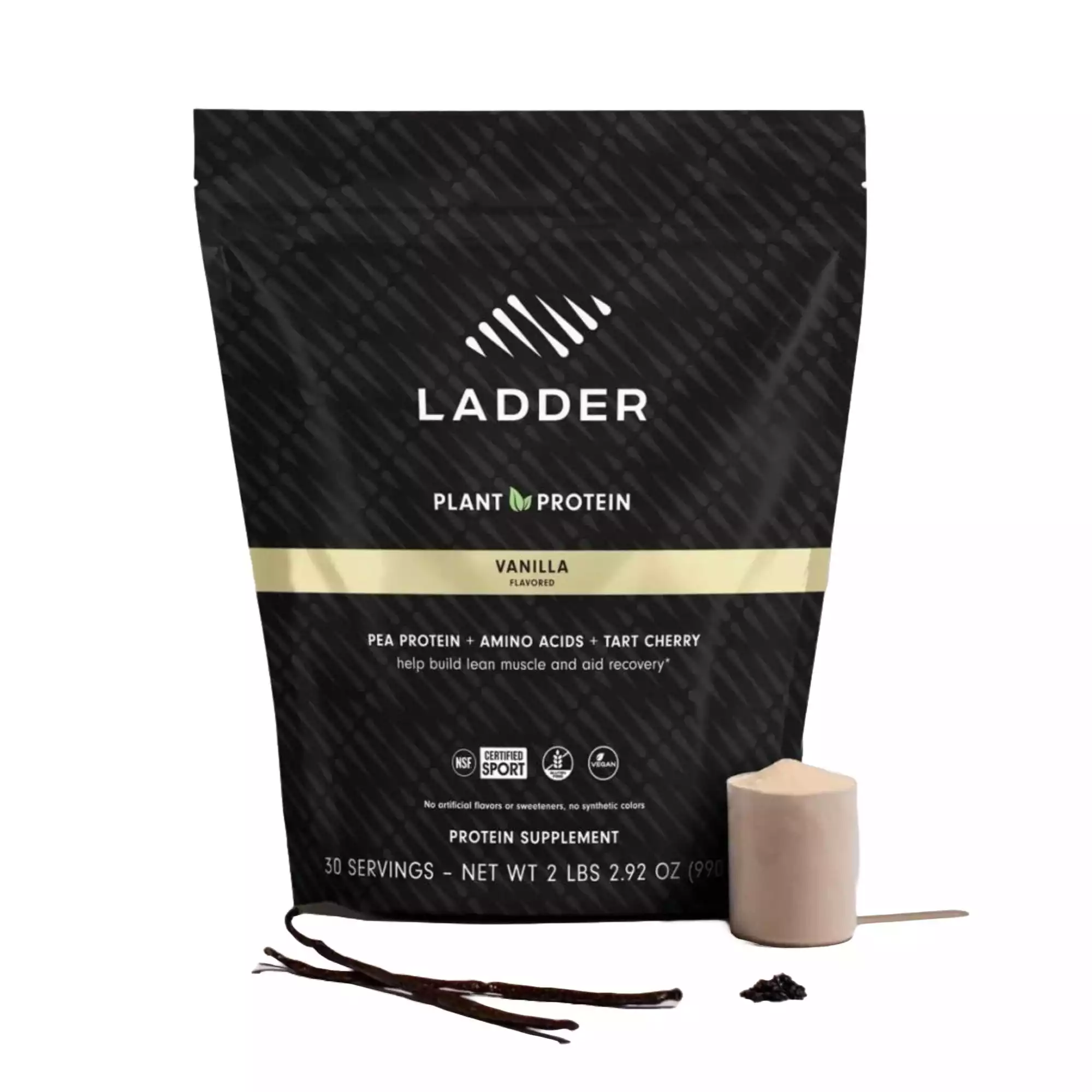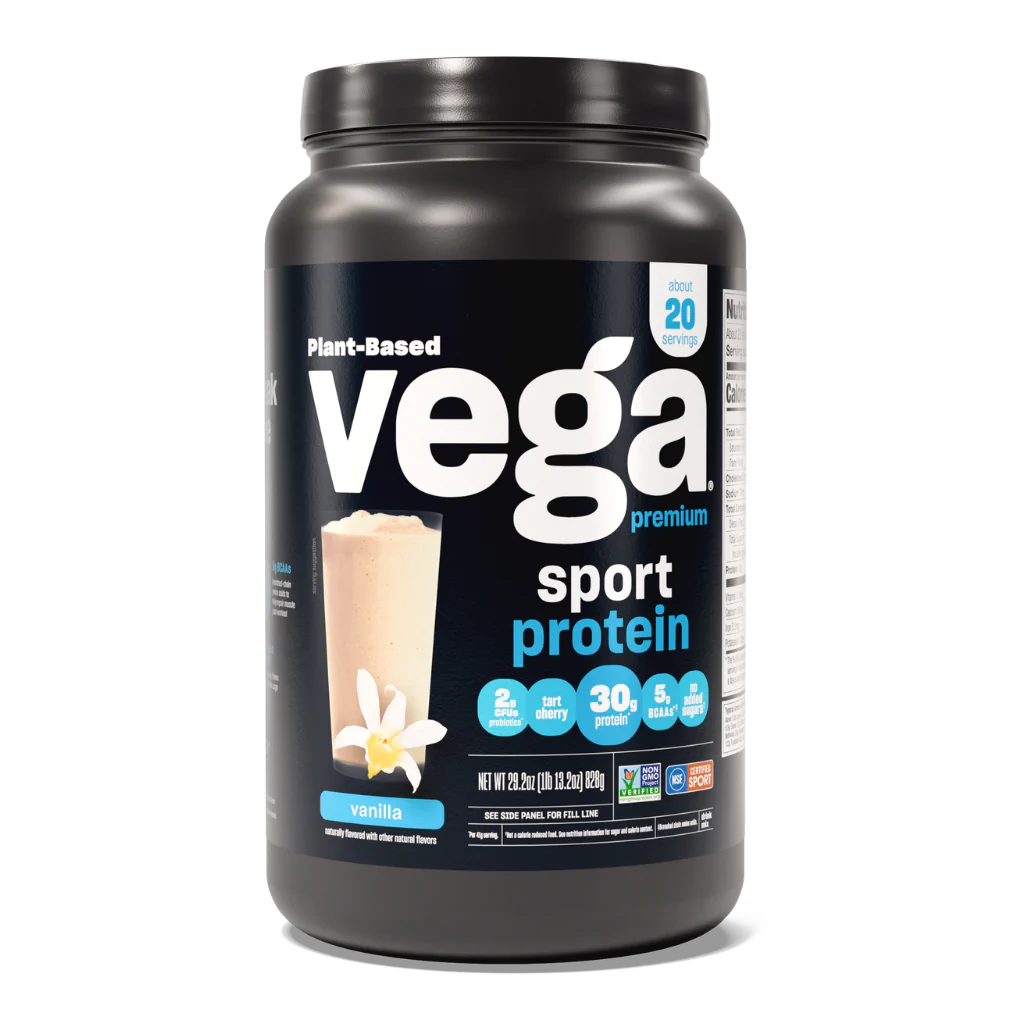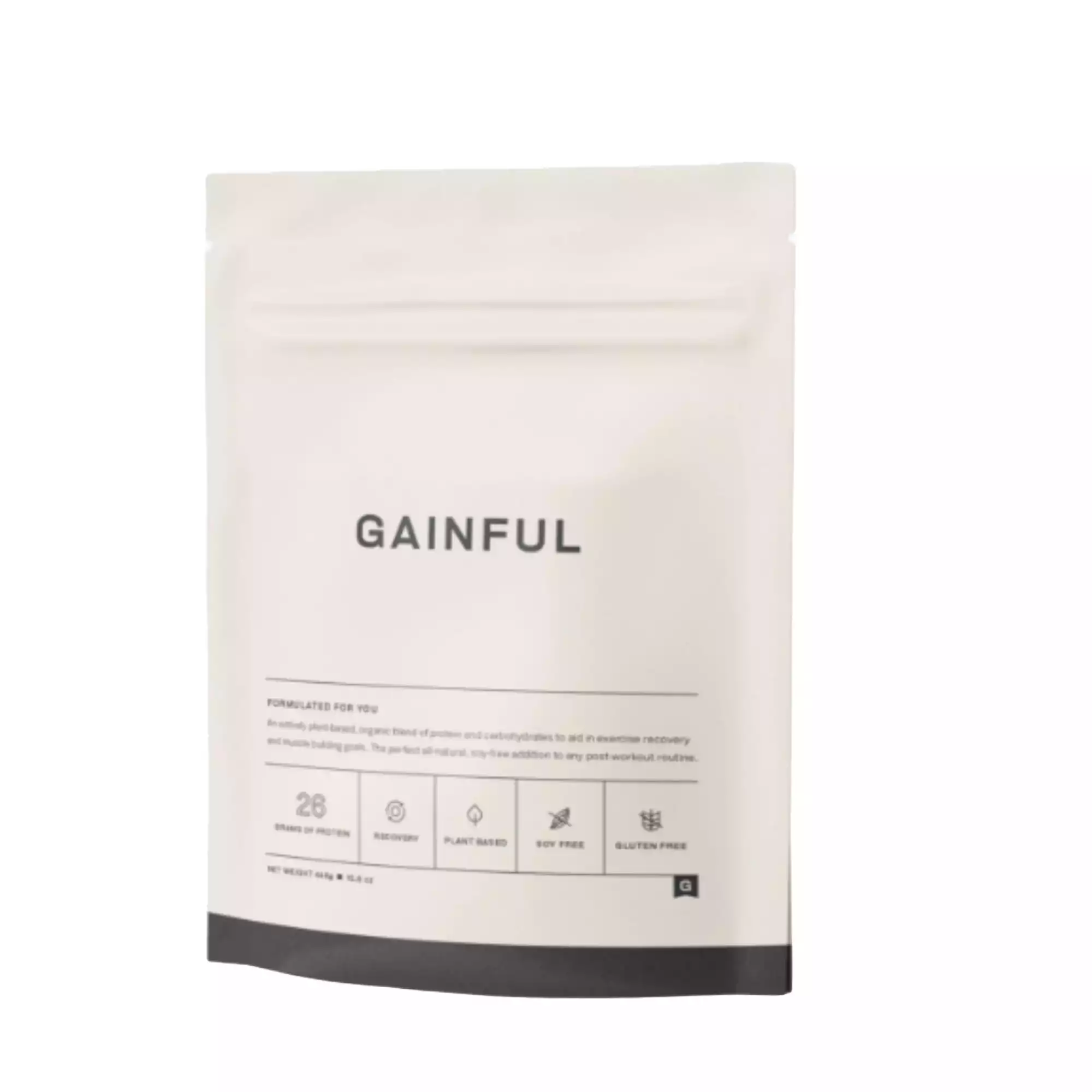We receive free products and receive commissions through our links. See disclosures page.
Have you shied away from pea protein powders because you think they won’t support your fitness goals? As a registered dietitian nutritionist, I often recommend that my clients incorporate more plant-based proteins into their diets. They can absolutely help you build muscle, recover quicker after the gym, and possibly decrease the likelihood of developing a chronic disease.
In this review, we will investigate the ingredients and health-promoting benefits behind our top picks for the best pea protein powder supplements. Whether you are hoping to increase muscle mass, manage your weight, boost your immune system, or decrease post-workout recovery time, we are sure to have a pea protein powder for you.
Medical disclaimer: This article is intended for educational and informational purposes only. It is not intended as a substitute for medical advice. For health advice, contact a licensed healthcare provider.
How We Chose the Best Pea Protein Powder
Here at Breaking Muscle, our mission is to help you achieve your goals by recommending the best protein powders and other supplements that will reinforce all the hard work you do in the gym. Not only have we personally tested over 75 protein powders (including at least a dozen pea protein powders), we thoroughly researched each product below so that you can choose the best pea protein powder for you.
We also reviewed each brand’s macronutrients (carbohydrates, fat, and protein content), total calories per serving, affordability, flavor profiles, and third-party verification so you can save time and money while making an informed decision.
Our Top Picks for the Best Pea Protein Powders
- Best Pea Protein Powder Overall: Transparent Labs Organic Vegan Rice & Pea Protein
- Best Tasting Pea Protein Powder: Swolverine Plant Protein
- Best Pea Protein Powder for Weight Loss: Naked Nutrition Pea Protein
- Best Pea Protein Powder for Muscle Building: Ladder Plant Protein
- Best Vanilla Pea Protein Powder: Vega Sport Premium
- Best Pea and Rice Protein Powder: Transparent Labs Organic Vegan Rice & Pea Protein
- Best Organic Pea Protein Powder: Gainful Vegan Protein Powder
Best Pea Protein Powder Overall: Transparent Labs Organic Vegan Rice & Pea Protein
Pros
- Made without artificial sweeteners, preservatives, and coloring
- Vegan-friendly
- Gluten- and dairy-free (no lactose)
- Reviewers report ease of mixability and digestibility
Cons
- Has 260 milligrams of sodium per serving
We don’t hand out the title for best overall to just any pea protein powder supplement. Transparent Labs Organic Vegan Rice & Pea Protein powder sits atop our list because it’s third-party tested to ensure it’s free of toxic ingredients, offers an impressive 24 grams of protein per serving, and has excellent solubility.
This organic yellow pea and rice protein powder has 2,060 milligrams of naturally occurring flavor, 310 milligrams of Himalayan rock salt, and 270 milligrams of organic stevia. Himalayan rock salt is where most of the sodium from this product derives from. There are 260 milligrams of sodium per scoop, which is high compared to other pea protein powders that have closer to 110 milligrams of sodium per scoop. However, most healthy individuals can safely consume up to 2,300 milligrams of sodium a day. Plus, Himalayan rock salt functions as a natural preservative and may offer some other benefits as well.
The pink color that Himalayan rock salt is known for comes from a combination of minerals such as calcium, magnesium, and potassium. (1) These minerals function as electrolytes, which can help prevent and treat dehydration. Magnesium helps to control whole-body inflammation after working out, delay the onset of fatigue during exercise, and possibly increase muscle mass. (2)
Transparent Labs uses stevia as a naturally occurring, plant-based sweetener. Researchers have found that stevia can help facilitate weight loss and assist with the management of high blood pressure. It also has anti-inflammatory and anti-microbial properties and can help improve heart contraction and blood flow. (3)
We had a Breaking Muscle staff member try the French Vanilla flavor, and she only rated it 2 stars out of 5. She found that it tasted artificial despite containing only natural ingredients, which she thinks may be due to the stevia.
However, reviewers on the Transparent Labs website report that they keep coming back to this pea protein powder because of its consistency in ingredient quality. They are particularly pleased with the taste, especially the chocolate-flavored option.
Regarding solubility, our product tester gave it 3.75 stars out of 5 because it foamed a lot. She also noted that it had a gritty texture, though it wasn’t too off-putting.
Again, other users’ experiences seem to vary. When it comes to mixability, customer reviews on the website say that it blends perfectly in both beverages and foods like pancake mix.
We did give the Transparent Labs Organic Vegan Rice & Pea Protein 4 out of 5 stars for its overall macronutrient profile and high marks for its clean ingredients and label transparency. If you’re looking for a pea protein powder that doesn’t contain artificial ingredients, tells you exactly what’s in its formula, and delivers a high amount of protein per serving, this is one worth trying.
RELATED: Best Organic Protein Powder
Best Tasting Pea Protein Powder: Swolverine Plant Protein
4.4
- Number of servings: 30
- Cost per serving: $1.77
- Calories per serving: 130
- Protein per serving: 22 grams
- Flavors: Chocolate Cake, Salted Caramel
- Third-party tested: Lief and Micro Quality labs – an ISO/IEC 17025 accredited laboratory
Pros
- A significant source of iron — 32% of the recommended daily value
- Soy-free, gluten-free, and manufactured without genetically modified organisms (non-GMO)
- Sourced from a GMP-certified facility and made in the USA
Cons
- Has 330 milligrams of sodium per serving
Your search for the best-tasting pea protein powder is over. Available in two delicious flavors (Chocolate Cake and Salted Caramel), Swolverine Plant Protein is sure to not only excite your taste buds but also help you meet your fitness goals.
As of this writing, it has 4.8 out of 5 stars based on 131 reviews across four purchasing platforms. The majority of reviewers are very pleased with this plant-based protein powder’s mixability. They also like that they can combine the two flavors with other ingredients to create protein-packed items, such as milkshakes, brownies, and muffins.
One of our product testers, who is also a certified personal trainer, competitive Olympic weightlifter, and former CrossFit affiliate owner, generally agrees with other consumers’ assessments. She found the texture slightly grainy but couldn’t see any clumps left behind after she mixed it in a shaker bottle. She also loved the Salted Caramel flavor, noted that it is easily drinkable even when mixed with water, and described it as one of the only plant-based protein powders they actually like.
Pea protein is tied to the prevention and management of several chronic diseases. It is also super beneficial for bulking muscle mass and decreasing your recovery time post-workout. For these reasons, many vegan protein powder brands rely solely on peas, specifically yellow peas, as their protein source. However, Swolverine is one of the few brands that incorporates pumpkin protein into its formula.
In addition to the 22 grams of pea protein isolate you get per 34-gram scoop, you get 7.7 grams of pumpkin protein. Pumpkin protein may help prevent and treat diabetes, increase antioxidant function, and even reduce episodes of depression. Pumpkin seeds (where pumpkin protein comes from) are high in vitamins and minerals that can help reduce your likelihood of developing diseases such as osteoporosis, cancer, cardiovascular disease, and diabetes. This form of protein also contributes to muscle relaxation post-workout. (4)
Tip: Try mixing this powder with soy or oat milk for enhanced plant-based protein intake. Per cup, you will get an additional eight grams of protein from soy milk and four grams from oat milk.
Best Pea Protein Powder for Weight Loss: Naked Nutrition Pea Protein
Naked Nutrition Pea Protein Powder
4.2
- Number of servings: 76
- Cost per serving: $0.76
- Calories per serving: 120
- Protein per serving: 27 grams
- Flavors: Chocolate, Unflavored, and Vanilla
- Third-party tested: Informed Choice Certified, ICP Mass Spectrometry tested for heavy metals
Pros
- Made without additives, artificial sweeteners, artificial flavors, and artificial colors
- Has a vast amino acid profile to help support your overall health
- Two grams of naturally occuring sugar and zero grams of added sugar
Cons
- A serving size is two scoops, whereas most comparative products are one scoop of powder per serving
For a mere 120 calories, you will get 27 grams of protein for only two grams of carbs and 0.5 grams of total fat per serving of Naked Pea Protein, which is why it wins our award for the best pea protein powder for weight loss. To sweeten the deal, Naked Pea Protein also uses no artificial ingredients. Rest assured that this pea protein powder is here to help you attain the level of fitness you seek.
Yellow pea protein isolate — the only ingredient listed on the supplement label — has been strongly correlated with reducing the risk of obesity, diabetes, and hypertension. These three disease states are the major contributors for developing chronic kidney disease. (5) As a Board Certified Specialist in Renal Nutrition, I heavily encourage plant-based eating as a way to preserve remaining kidney function.
The nutrition facts label provides insight into the wide array of specific nutrients you will get nine essential amino acids, three high-quality branched-chain amino acids (BCAAs), and seven non-essential amino acids. Supplementing with branched-chain amino acids has been identified as a novel way to increase the likelihood of losing weight. This is because they may improve the way our bodies absorb carbohydrates and metabolize them effectively for weight loss. (6)
A serving size of Naked Pea Protein will provide you with 16 percent of your recommended daily value of iron. Having adequate stores of iron is associated with controlling inflammation throughout your body, which can help reduce obesity. (7) Iron that comes from plant-based sources versus whey or other animal-based sources is referred to as “non-heme iron” and is not as easily absorbed as animal-based iron (or “heme iron”). However, pairing iron with vitamin C can help increase iron absorption.
To get the most from your Naked Pea Protein, consider pairing your protein shake with a low-calorie, nutrient-dense fruit or vegetable snack on the side: oranges, mangoes, red bell peppers, broccoli, legumes, kiwi, spinach, strawberries, or tomatoes.
Many users report that this powder doesn’t have a lingering metal after-taste like other protein powders. It blends really well without any leftover clumpy residue.
A Breaking Muscle product tester also gives Naked Pea Protein high marks for solubility, rating it 4 out of 5 stars. She especially likes mixing it with oats because it gives them a rich, creamy texture.
However, she only gave it 2.5 out of 5 stars for taste. It is unflavored, so scoring low in this category isn’t surprising. She recommends starting with one scoop instead of the recommended two scoops if you aren’t used to pea protein powders; otherwise, you’ll need to use some sweeteners or add it to another flavored beverage to make it more palatable.
RELATED: Best Creatine Supplements
Best Pea Protein Powder for Muscle Building: Ladder Plant Protein
4.0
- Number of servings: 30
- Cost per serving: $2.00
- Calories per serving: 130
- Protein per serving: 21 grams
- Flavors: Chocolate, Vanilla
- Third-party tested: NSF International’s Certified for Sport
Pros
- Offers three grams of dietary fiber per serving, which is comparably higher than other supplements
- Contains 1,000 milligrams of a proprietary blend of L-leucine, L-methionine, L-isoleucine, and L-valine
- Each serving provides you with 480 milligrams of tart cherry, which may help reduce muscle soreness
Cons
- Not an ideal choice of supplements for those with cardiovascular disease
- Packaged in a bag versus a container — some reviewers have found it difficult to fit their hand into the bag to scoop it
Co-founders LeBron James and Arnold Schwarzenegger teamed up to create the Ladder brand, and their vegan amino acid blend can help support your performance and build lean muscle mass. In fact, research shows that supplementing with pea-based protein powder is just as effective as the best whey protein powder for muscle mass growth. (8)
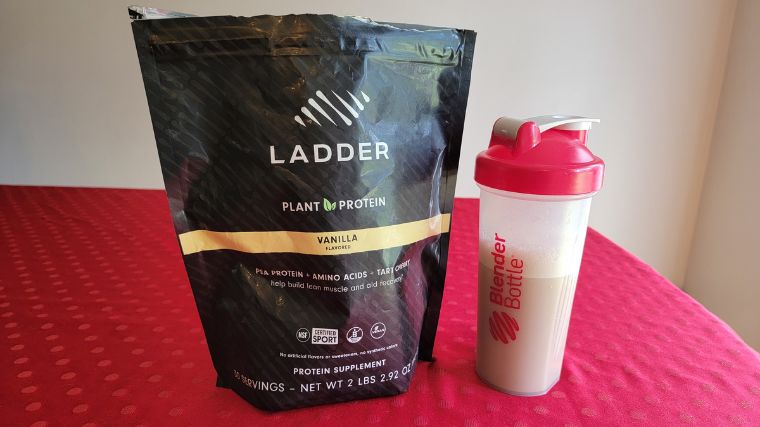
With every scoop of Ladder Plant-Based Protein, you will get 1,000 milligrams of the amino acids l-leucine, l-methionine, l-isoleucine, and l-valine. Leucine, isoleucine, and valine are classified as high-quality branched-chain amino acids. These BCAAs, especially leucine, may play a significant role in protein synthesis and increasing lean muscle mass. (9)
This product has a whopping 530 milligrams of sodium per serving. A good rule of thumb is to choose products with less than 200 milligrams of sodium per serving to promote heart health. Sodium is also an electrolyte and therefore needed for post-workout recovery. However, Ladder Plant-Based Protein may not be ideal for those limiting sodium intake and/or those who have a heart condition. (10)
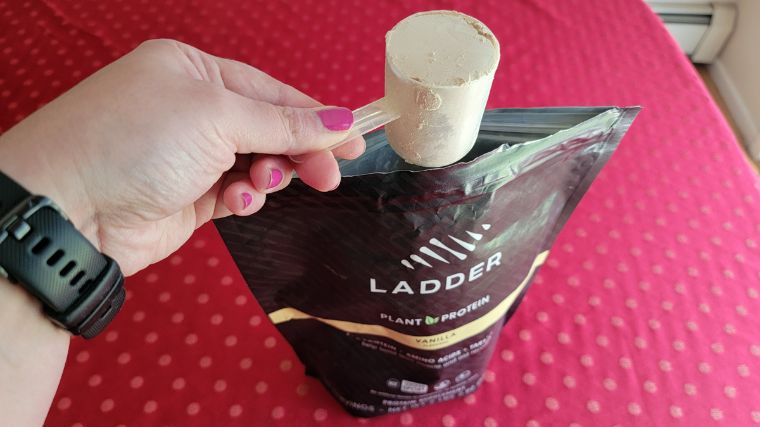
On the Ladder website, users report some issues with the solubility of this product. Many report that using shaker bottles is not enough to completely dissolve the powder. There are also mixed reviews about the flavor.
However, Breaking Muscle Reviews Editor Amanda Dvorak uses Ladder’s plant-based protein regularly and enjoys it. She gives Ladder Plant-Based Protein 4 out 5 stars for taste and texture and 4.5 out of 5 stars for solubility.
“I usually opt for whey protein, but I like having some plant-based protein powder in my pantry because too much dairy can sometimes make my rosacea and other skin issues worse,” she says. “It’s hard for me to find a plant-based protein powder that I truly like, but I honestly love Ladder. I get a slight earthy taste with the Vanilla flavor, but it’s not as bad as other vegan protein powders I’ve had. It’s also one of the smoothest plant-based protein powders I’ve ever tried. It’s not super grainy and leaves virtually no clumps behind.”
RELATED: Best Protein Powder for Muscle Gain
Best Vanilla Pea Protein Powder: Vega Sport Premium
4.2
- Protein type: Alfalfa, pea, pumpkin seed, sunflower seed
- Number of servings: 12 to 20
- Cost: $2.22 to $3.55 per serving
- Calories per serving: 170 to 180
- Protein per serving: 30 grams
- Flavors: Berry, Chocolate, Mocha, Peanut Butter, Vanilla
- Third-party tested: NSF Certified for Sport
Pros
- Vega participates in the Veritree program (planting trees for purchases)
- Vegan-friendly and gluten-free
- Provides you with two billion CFUs of Bacillus coagulans
- Great source of calcium – 260 milligrams per serving to give you 20% of your recommended daily value
Cons
- Some users report a narrow tub opening that can impede scooping with ease
- Less affordable when compared to other brands
Ironically, our favorite protein powder for vanilla flavor is the supplement that offers the most flavors in this review: Vega Sport Premium. Users seem to be happy with all flavors offered, but most reviewers who bought the vanilla flavor harp on how excellently it blended into smoothies with berries without leaving a gritty texture.
Speaking of good, Vega Sport Premium plants a tree for every order they receive. If that doesn’t make you want to read more about them, allow me to introduce you to tart cherries.
Tart cherries have both antioxidant and anti-inflammatory properties and may help prevent major chronic diseases like heart disease, cancer, diabetes, and obesity. For post-workout, tart cherries may allow for a faster recovery time in returning to your peak form and lead to less muscle fatigue. (11)
The combination of protein sources used in Vega Sport Premium is special. In addition to the humble pea, you will also get pumpkin seeds, alfalfa, and organic sunflower seeds. This protein blend leads to you getting an awesome 30 percent of your recommended daily amount of iron in every 41-gram scoop of Vega Sport Premium. Iron is an essential mineral, meaning that we can only get it from dietary means. It is important to ensure we get enough of it every day to prevent anemia, support the nervous system, and help with metabolic processes. (12)
The Vega Sport Premium website recommends that you mix this product with cold water or a non-dairy beverage, such as plant-based milk, for best results. However, adding this protein powder to a smoothie or a favorite recipe is also recommended. The brand’s website even offers suggestions for creative ways to use their yummy pea-based protein powder, such as pumpkin spice protein pancakes.
Best Pea and Rice Protein Powder: Transparent Labs Organic Vegan Rice & Pea Protein
Pros
- Made with only 2 grams of sugar and zero grams of added sugar
- Low-fat option with zero milligrams of cholesterol
- Manufactured with a 2:1 ratio of organic rice protein and organic pea protein isolate
Cons
- Limited flavor options
Transparent Labs Organic Vegan Rice & Pea Protein uses a 2:1 protein ratio of 20,000 milligrams of organic rice protein and 9,411 milligrams of organic pea protein isolate.
Research studies have demonstrated that the use of rice protein is appropriate after resistance exercise due to its ability to improve overall body composition and increase sports performance. Studies have also found that there are no major differences worth noting between the participants who received whey versus brown rice protein. This means that this form of protein can help facilitate muscle mass build while simultaneously improving endurance. (13)
Pea protein is often mechanically split during manufacturing, whereas soy-based and whey-based proteins have to be chemically split. This translates into the pea protein source remaining intact and therefore being more naturally nutrient-dense, particularly when it comes to soluble fiber. This form of fiber is really beneficial for preventing heart damage and promoting the health of your digestive system. (5)
Tip: Many reviewers report that Transparent Labs Organic Vegan Rice & Pea Protein powder mixes very easily with oatmeal and blends well into smoothies. According to reviews, all flavors offered are delicious and blend well without clumping. Users appreciate that this product is cruelty-free and uses clean ingredients that can be incorporated into a variety of things: water, soy milk, banana bread, and smoothies.
Best Organic Pea Protein Powder: Gainful Vegan Protein Powder
4.5
- Number of servings: 14 to 28 packets per bag
- Cost per serving: $1.61 to $3.21
- Calories per serving: Will depend upon your nutrition prescription results
- Protein per serving: Will depend upon your nutrition prescription results
- Flavors: Caffe Mocha, Chocolate Peanut Butter, Cookies & Cream, Madagascar Vanilla, Rich Cocoa, Strawberry Cream, and Unflavored
- Third-party tested: None, at the time of this writing
Pros
- Comes in pre-made packets that are individualized to your needs
- Subscribing gets you free access to speak to a registered dietitian nutritionist
- You can opt to receive several different flavors in your shipment
Cons
- Reviewers report some issues with how easily the product mixes
- Not third-party or independently tested for ingredient purity
If you are looking for an organic-certified pea protein, Gainful Vegan Protein Powder is our top pick. You have the choice of organic brown rice protein, organic pea protein, or a combination of both of these plant-based protein sources.
Gainful Vegan Protein Powder is unlike any other supplement we have reviewed. With most protein powders, you simply add them to your online (or literal) shopping cart, and off you go. However, to add this product to your online cart, you will be prompted to take a quiz that analyzes nutrient-influencing factors that are specific to you.
They have a team of registered dietitian nutritionists (RDNs) on board to expertly tailor the Gainful Vegan Protein Powder to your body type and fitness goals. Your nutrition goals, the type of exercise you routinely do, your age, height, weight, goal body weight, top three health goals, dietary restrictions, and dietary patterns are all evaluated to make a protein supplement that best supports you. To make things effortless, you will receive 14 to 28 pre-packaged servings so that you can add them to the beverage or food option of your choice with ease.
This supplement checks a lot of boxes and should be easier for you to absorb and digest when compared to other products on the market. This is due to Gainful using ingredients that are gluten-free, soy-free, vegan- and vegetarian-friendly, and free of most major allergens.
To increase the provided health benefits and decrease gut sensitivity, this pea protein powder is also naturally sweetened with organic monk fruit and organic stevia leaf extract.
We haven’t tried the vegan protein option from Gainful, but one of our product testers has received a custom blend of whey concentrate, whey isolate, and casein protein powder. She rated the company 5 out of 5 stars for customer service and 5 out of 5 stars for its overall formula due to how personalized it is to her unique needs (she chose recovery and satiety as her main concerns).
It is sure to fit into your lifestyle because it is made for all forms of exercise, whether you do CrossFit, run, practice yoga, dance, or engage in any other kind of physical activity.
RELATED: Best Protein Shakes for Weight Loss, Muscle Gain, Diabetes, and More
Benefits of Pea Protein Powder
Protein is a fundamental macronutrient that plays an extremely important role in your diet. Pea protein powder will provide you with many health benefits. Most notable are:
- Promote weight gain via increased muscle mass or weight loss via decreased fat mass (5)
- Potentially decrease your risk of chronic illness development (5)
- Increase post-workout recovery time and strength (8)
- Improve overall muscle mass (8)(18)
How Much Pea Protein Powder Should You Have Per Day?
When determining the amount of pea protein powder you should have per day, keep in mind that it should supplement your overall daily protein intake goal. You should still prioritize whole-food sources instead of replacing them.
Generally speaking, protein should compose 10 to 35 percent of your daily intake of calories. However, the amount of protein you need per day is based on several factors, including age, sex, level of physical activity, and your fitness goals. (14)
If you are interested in a quick calculation, open the calculator app on your phone. To keep things simple and determine your recommended dietary allowance of protein, multiply 0.8 grams of protein by your weight in kilograms. If you are an avid exerciser, want to add muscle mass, or are even just starting out at the gym, you will need more protein to help with the recovery of muscle micro-tears, improve mass, and increase muscle strength. You may need to increase this number to anywhere from 1.0 to 1.6.
Essential amino acids are the fundamental building blocks for protein that we have to get from dietary sources. Pea protein is almost a complete protein source. However, it is not an adequate source of the essential amino acid methionine. That being said, you can have pea protein powder every day, but it is very important that it is not your only source of protein throughout the day. To follow a more plant-based diet, consider pairing your pea protein powder with good sources of methionine, such as soybeans, nuts, navy beans, wild rice, or kidney beans.
What To Consider When Buying Pea Protein Powder
Deciding to add dietary supplements to your diet can open you up to a world of benefits. However, in order to optimize your health, it is vital to choose a product that contains ingredients (and specific ingredients in appropriate amounts) that contribute to accomplishing your goals. Try to avoid picking just any powder because it has pea protein in it. Choose a pea protein powder that is designed with your health and fitness goals in mind. To make things easier on you, let the guide below be a resource for what to look for in a pea protein supplement.
Macronutrients
Knowing the recommended amount of macronutrients (carbohydrates, fat, and protein) you should consume in a day goes hand in hand with accomplishing your health and physical activity goals.
For example, if you are prepping for a marathon and have worked out for a long period of time, it is important to replenish the amount of glucose stored in your muscles. This will help your body adapt to longer exercise times and repair tissue damage. Therefore, choosing a pea protein powder with a high amount of carbohydrates will be extremely useful.
It is also important to replenish muscle glycogen when working out to fuel your muscles. Carbs help with endurance during your workout and recovery after your workout. For moderate exercise that lasts longer than 30 minutes, multiplying 1.2 grams of carbohydrates for every kilogram of your body weight will help with replenishing glucose levels. (15)
The amount of fat you desire in your pea protein powder will be highly dependent upon your individualized goal. If your goal is to gain weight, a higher fat and higher calorie product would be appropriate. Lean towards the higher end of that percentage range — 30 to 35 percent of your total daily calories. (16) Otherwise, limit total fat intake to 20 to 35 percent of your total daily calorie intake.
Always assess the type of fat in the ingredients label prior to purchase. Ingredients that are high in omega-3 fatty acids, like pumpkin seeds and sunflower seeds, will offer a wide array of health benefits and are therefore encouraged. They help to decrease your likelihood of developing a chronic illness, may improve cognitive function, and are likely to be able to improve blood lipid panels (lab work that looks at fat in the blood). (17)
Protein is essential for repairing the muscles post-workout and increasing muscle mass. It is also a very satiating macronutrient — meaning that it helps to fight hunger and manage weight more easily. The amount of protein you will need in a day will vary greatly by age, sex, and physical activity level. Aiming for at least 20 grams of protein per serving when choosing a pea protein powder is a good general rule. In order to make sure that you are meeting macronutrient goals that best support your health journey, consult with a registered dietitian nutritionist!
Other Ingredients
Some pea protein powders are made with artificial sweeteners such as sucrose and may cause gastrointestinal irritation. For those who are sensitive to it, it would be better to choose a product made with plant-based sugars like stevia.
Depending on what you hope to achieve with the addition of pea protein powder to your diet, choose a product that will help you accomplish those goals. For example, those working out routinely would benefit from branched-chain amino acids being in their supplement’s formulation. Those who sweat heavily during exercise and/or are working out outside routinely would benefit from having a higher volume of electrolytes in their pea protein powder.
Flavors
Like many other factors, flavor plays a huge role in the decision-making process. Before jumping into using a product, consider how you want to use your pea protein powder. Many people opt for the traditional shaker bottle and water. So it will be important for you to choose a pea protein powder that is a flavor that you like. However, smoothies and smoothie bowls are also a popular way to incorporate pea protein powder into your daily routine.
If you are looking for ways to bulk up your nutrient intake, try adding pea protein powder to steel-cut oatmeal, overnight oats, whole-grain cereal, pancake or waffle batter, cake or muffin batter, or even your coffee. The supplement you choose will influence the flavor profile you are trying to achieve.
Vanilla pea protein powder added to dark chocolate chips and banana muffin batter is a go-to in my household. It’s also a good choice for mixing with any of your favorite bodybuilding supplements. Really, vanilla flavor works well in just about everything. You can use pea protein powder to make a more nutrient-dense and healthier version of the dessert of your choosing. Try adding chocolate peanut butter flavored pea protein to cookie batter or cafe mocha flavored pea protein to coffee.
Third-Party Testing
Dietary supplements are not regulated by the Federal Drug Administration (FDA). So in order to establish brand credibility and trust, manufacturers use third-party testing. Independent third-party testing essentially verifies that the ingredients used by the manufacturer are pure, free of contamination, and in the quantities represented on the supplement’s label. Contamination can come in many forms and different third-party testing looks for different specifications — microbial life, heavy metals, and toxins are just some examples.
Price
The pea protein powders found in this review will vary from $0.76 to $3.24 a serving. The more affordable options are not necessarily manufactured with ingredients that are cheaply sourced. In the case of the products above, products on the higher end of the price range simply have more ingredients, to increase the amount of benefits you are exposed to.
For example, the most expensive product (Vega Sport Premium) offers what other products do not: 2 billion CFUs of probiotics to help with gut nutrient digestion and absorption. The second most expensive powder (Gainful Vegan Protein Powder) is quite literally individualized to you and therefore specially formulated to meet your needs.
Final Thoughts
Pea-based protein powder is an easy way to incorporate beneficial vegetable nutrients and help you to keep up your health and wellness desires. Before you add just any pea protein powder to your Amazon cart, rely on this review as a guide for the best protein powders, made from premium pea protein blends. We do the hard work for you of analyzing the many plant-based pea protein powders out there to consolidate them down into our top picks.
Pea protein powder is a great product to help you build muscle, manage body weight, decrease your post-workout recovery time, and ensure that you are consuming enough daily protein to support your fitness goal. This guide was researched by a nutrition expert to give you peace of mind and confidence in your dietary supplement choice.
Best Pea Protein Powder: Side-by-Side Comparison
Best Pea Protein Powder Overall
Best Tasting Pea Protein Powder
Best Pea Protein Powder for Weight Loss
Best Pea Protein Powder for Muscle Building
Best Vanilla Pea Protein Powder
Best Organic Pea Protein Powder
4.5
Description:
- Number of servings: 14 to 28 packets per bag
- Cost per serving: $1.61 to $3.21
- Calories per serving: Will depend upon your nutrition prescription results
- Protein per serving: Will depend upon your nutrition prescription results
- Flavors: Caffe Mocha, Chocolate Peanut Butter, Cookies & Cream, Madagascar Vanilla, Rich Cocoa, Strawberry Cream, and Unflavored
- Third-party tested: None, at the time of this writing
FAQs
Which is better: pea or whey protein?
A good source of high-quality protein is going to be what best meets your needs. If you are a practicing vegan or simply desire more plant-based dietary sources, a pea-based protein supplement would be the better choice. Most pea and whey protein powders are relatively low in carbs and fat, with at least 20 grams of protein per scoop. Honestly, one is not better than the other; they are both great protein choices. It just comes down to what you are looking for.
Is it safe to drink pea protein every day?
Pea protein is plant-based and considered safe for daily consumption. However, it is recommended that the majority of your daily micro and macronutrient intake derive from whole-food nutrition and beverage choices. The nutrients found in pea protein powders should merely supplement your normal intake of protein, not completely replace it.
Does pea protein have side effects?
Most users report little to no side effects when using pea protein powder. For those with sensitive digestive systems, some bloating or gas has been reported. This is especially true for those who regularly use pea protein powders for total meal replacement.
Does pea protein have high estrogen?
Estrogen is a hormone synthesized by the human body. So technically no, pea protein is not high in estrogen because it literally can not contain it. However, it is composed of nutrients called phytoestrogens. Phytoestrogens have been found to mimic the hormone estrogen in the human body. When compared to other dietary sources (like soy-based protein), pea protein contains a miniscule amount of phytoestrogen.
Does pea protein build muscle like whey?
The short answer here is yes; pea protein builds muscle like whey protein. Several research studies support the use of pea protein for muscle growth. Most of these studies demonstrate no difference in muscle size or muscle strength in those who supplement with pea protein, as opposed to whey protein. (18)
Research
- Carapeto C; Brum S; Rocha MJ. Which table salt to choose?. Nutr Food Sci. 2018;8:1-4. ISBN: 2155-9600.
- Heffernan SM, Horner K, De Vito G, et al. The role of mineral and trace element supplementation in exercise and athletic performance: a systematic review. Nutrients. 2019;11(3):696. doi: 10.3390/nu11030696
- Hossain MF, Islam MT, Islam MA, et al. Cultivation and uses of stevia: a review. AJFAND. 2014;17(4). doi: 10.18697/ajfand.80.16595
- Hussain A, Kausar T, Sehar S, et al. A Comprehensive review of functional ingredients, especially bioactive compounds present in pumpkin peel, flesh and seeds, and their health benefits. Food Chem Adv. 2022:1. doi: 10.1016/j.focha.2022.100067
- Krefting J. The appeal of pea protein. JRN. 2017;27(5):31-33. doi: 10.1053/j.jrn.2017.06.009
- Shah SH, Crosslin DR, Haynes CS, et al. Branched-chain amino acid levels are associated with improvement in insulin resistance with weight loss. Diabetologia. 2012;55:321–330. Doi: 10.1007/s00125-011-2356-5
- Zafon C, Lecube A, and Simó R. Iron in obesity. An ancient micronutrient for a modern disease. Obes Rev. 2010;11:322-328. doi: 10.1111/j.1467-789X.2009.00638.x
- Banaszek A, Townsend JR, Bender D, et al. The effects of whey vs. pea protein on physical adaptations following 8-weeks of high-intensity functional training (hift): a pilot study. Sports. 2019;7(1):12. doi: 10.3390/sports7010012
- Nie C, He T, Zhang W, et al. Branched chain amino acids: beyond nutrition metabolism. Int J Mol Sci. 2018;19(4):954. doi: 10.3390/ijms19040954
- Zhang Z, Cogswell ME, Gillespie C, et al. Association between usual sodium and potassium intake and blood pressure and hypertension among U.S. adults: NHANES 2005–2010. PLOS. 2013;8(10):75289. doi: 10.1371/journal.pone.0075289
- Vitale K, Hueglin S, Broad E. Tart cherry juice in athletes: a literature review and commentary. Curr Sports Med Rev. 2017;16(4):230-239. doi: 10.1249/JSR.0000000000000385
- Elstrott B, Khan L, Olson S, et al. The role of iron repletion in adult iron deficiency anemia and other diseases. Eur J Haematol. 2020;104:153–161. doi: 10.1111/ejh.13345
- Joy JM, Lowery RP, Wilson JM, et al. The effects of 8 weeks of whey or rice protein supplementation on body composition and exercise performance. Nutr J. 2013;12:86. doi:10.1186/1475-2891-12-86
- Wu G. Dietary protein intake and human health. Food Funct. 2016;7:1251-1265. doi: 10.1039/c5fo01530h
- Ivy JL. Regulation of muscle glycogen repletion, muscle protein synthesis and repair following exercise. J Sports Sci Med. 2004;3(3):131-138. PMID: 24482590
- Dietary Guidelines for Americans: Guidelines and Key Recommendations. National Library of Medicine. https://www.ncbi.nlm.nih.gov/books/NBK469839/#:~:text=Keep%20total%20fat%20intake%20between,low%20fat%2C%20or%20fat%20free. Last reviewed: November 16, 2017. Accessed September 08, 2023.
- Omega-3 fatty acids. National Institutes of Health: Office of Dietary Supplements. https://ods.od.nih.gov/factsheets/Omega3FattyAcids-Consumer/. Last reviewed: July 18, 2022. Accessed September 01, 2023.
- Babault N, Paizis C, Deley G, et al. Pea proteins oral supplementation promotes muscle thickness gains during resistance training: a double-blind, randomized, Placebo-controlled clinical trial vs. Whey protein. J Int Soc Sports Nutr. 2015;12:1. doi: 10.1186/s12970-014-0064-5
